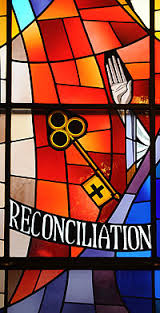 (CONFESSION)
1440
(CONFESSION)
1440 Sin is before all else an offense against God, a rupture of communion with him. At the same time it damages communion with the Church. For this reason conversion entails both God’s forgiveness and reconciliation with the Church, which are expressed and accomplished liturgically by the sacrament of Penance and Reconciliation.
Only God forgives sin
1441 Only God forgives sins. Since he is the Son of God, Jesus says of himself, “The Son of man has authority on earth to forgive sins” and exercises this divine power: “Your sins are forgiven.” Further, by virtue of his divine authority he gives this power to men to exercise in his name.
1442 Christ has willed that in her prayer and life and action his whole Church should be the sign and instrument of the forgiveness and reconciliation that he acquired for us at the price of his blood. But he entrusted the exercise of the power of absolution to the apostolic ministry which he charged with the “ministry of reconciliation.” The apostle is sent out “on behalf of Christ” with “God making his appeal” through him and pleading: “Be reconciled to God.”
Reconciliation with the Church
1444 In imparting to his apostles his own power to forgive sins the Lord also gives them the authority to reconcile sinners with the Church. This ecclesial dimension of their task is expressed most notably in Christ’s solemn words to Simon Peter: “I will give you the keys of the kingdom of heaven, and whatever you bind on earth shall be bound in heaven, and whatever you loose on earth shall be loosed in heaven.” “The office of binding and loosing which was given to Peter was also assigned to the college of the apostles united to its head.”
1445 The words bind and loose mean: whomever you exclude from your communion, will be excluded from communion with God; whomever you receive anew into your communion, God will welcome back into his. Reconciliation with the Church is inseparable from reconciliation with God.
The sacrament of forgiveness
1446 Christ instituted the sacrament of Penance for all sinful members of his Church: above all for those who, since Baptism, have fallen into grave sin, and have thus lost their baptismal grace and wounded ecclesial communion. It is to them that the sacrament of Penance offers a new possibility to convert and to recover the grace of justification. The Fathers of the Church present this sacrament as “the second plank [of salvation] after the shipwreck which is the loss of grace.” 1449 The formula of absolution used in the Latin Church expresses the essential elements of this sacrament: the Father of mercies is the source of all forgiveness. He effects the reconciliation of sinners through the Passover of his Son and the gift of his Spirit, through the prayer and ministry of the Church: God, the Father of mercies, through the death and the resurrection of his Son has reconciled the world to himself and sent the Holy Spirit among us for the forgiveness of sins; through the ministry of the Church may God give you pardon and peace, and I absolve you from your sins in the name of the Father, and of the Son, and of the Holy Spirit.
1495 Only priests who have received the faculty of absolving from the authority of the Church can forgive sins in the name of Christ.
1496 The spiritual effects of the sacrament of Penance are:
- reconciliation with God by which the penitent recovers grace;
- reconciliation with the Church; remission of the eternal punishment incurred by mortal sins;
- remission, at least in part, of temporal punishments resulting from sin;
- peace and serenity of conscience, and spiritual consolation;
- an increase of spiritual strength for the Christian battle.
Fr. Jeff is available for confession from 12:00 - 1:00 p.m., every Saturday in the main Church; or you may contact him anytime for an appointment.